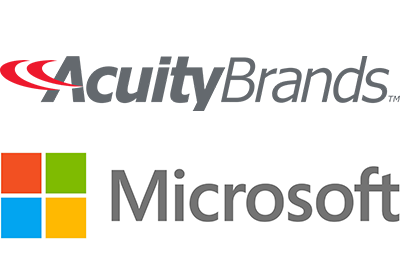Acuity Brands Partners with Microsoft to Enable Sustainable Building Solutions

February 2, 2022
Acuity Brands, Inc. announced it is expanding its collaboration with Microsoft to bring new capabilities to Acuity Brands smart lighting, lighting controls, and building automation solutions.
Acuity Brands has a bold goal to avoid 100m metric tons of carbon emissions as a result of projected 2020-2030 sales of LED luminaires, lighting controls, and building management systems replacing older technologies in existing buildings. By combining the power of Microsoft’s Cloud for Sustainability and Microsoft Azure IoT with Acuity Brands customer solutions, Acuity Brands and Microsoft will jointly enable end customers, operating many types of facilities and buildings, to forecast and calculate the environmental and financial impacts that these new lighting and building management technologies deliver.
“We estimate that building operations contribute 28% of global carbon emissions. By developing, deploying, and operating building systems with a focus on sustainability, we can materially reduce energy usage from facilities,” said Neil Ashe, Chairman, President and Chief Executive Officer of Acuity Brands. “Together with Microsoft, our goal is to integrate foundational technologies like Microsoft Azure IoT and AI with Acuity Brands solutions that allow companies to reduce carbon emissions while saving money on operating expenses.”
Acuity Brands provides industry-leading lighting and lighting controls technology. The company’s nLight® digital lighting controls platform, the Compact Pro™ High Bay by Lithonia Lighting®, and its other lighting and lighting controls offerings are currently deployed across 15 billion square feet of commercial real estate, including office space, retail stores, hospitals, and airports. Additionally, the Acuity Brands smart building and energy management portfolio includes the ECLYPSE® line of edge controllers by Distech Controls® to automate building functions and energy management services such as the Atrius® Building Manager.
Acuity Brands and Microsoft will collaborate to bring the Acuity Brands portfolio of applications to Azure, standardizing data ingestion and analysis via Azure Digital Twins and analysis of this data via Azure’s AI offering. Microsoft and Acuity Brands will also look to explore technology solutions that further evolve the way spaces can be evaluated, managed, and optimized in the future.
“Consistency and accuracy in calculating carbon reductions are critical to tracking progress towards corporate climate commitments,” said Matt Renner, President, U.S. Enterprise Commercial at Microsoft. “Acuity’s end-to-end portfolio of smart lighting, building controls, and building management technology, built on Microsoft Azure and Microsoft Cloud for Sustainability, will deliver immediate energy savings to companies across all vertical markets operating facilities and buildings, by integrating sensing, analysis, and actuation. Microsoft has bold commitments to be carbon negative, water positive, and zero waste by 2030, and we are pleased to partner with Acuity on its digital transformation journey. Together we will accelerate development of solutions that immediately impact carbon emissions from building operations and extend these solutions to companies of all sizes that will need simple solutions to meet their own climate goals.”











![Guide to the Canadian Electrical Code, Part 1[i], 26th Edition– A Road Map: Section 56](https://electricalindustry.ca/wp-content/uploads/2022/11/Guide-CE-Code-2.png)



